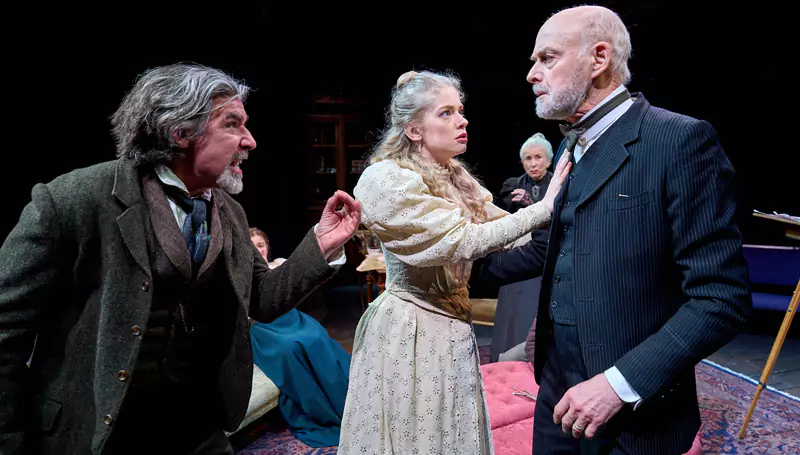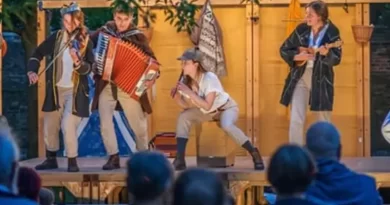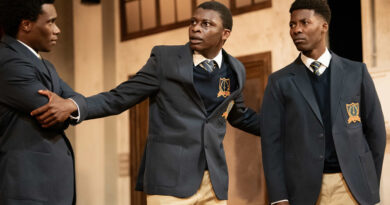“Uncle Vanya” at Orange Tree Theatre
Neil Dowden in south-west London
11 March 2024
The samovar is back! Trevor Nunn’s traditional production of Anton Chekhov’s Uncle Vanya set on a country estate in late 19th-century Russia is unusual these days. After decades of over-reverential treatment of the master’s work in the UK, his plays now tend to be taken out of their original context and sometimes transposed to a different place or time, or presented in a novel way (including recently Simon Stephens’s one-man version of Vanya performed by Andrew Scott in the West End). Here, in the intimate Orange Tree Theatre, under Nunn’s experienced, sensitive touch, the tragicomedy is allowed to breathe organically in a slow-burning production that ultimately reveals great emotional depth.

Lily Sacofshy and Andrew Richardson.
Photo credit: Manuel Harlan.
The drama may focus on the pre-revolutionary Russian landed gentry in decline, but really it is about people feeling they are not fulfilling their potential and who are unhappy in love. The dissatisfied fortysomething Vanya runs the estate on behalf of the city-based Serebryakov (who was married to his late sister), a pompous ageing academic now wed to a beautiful woman more than 30 years younger than him, Elena, with whom Vanya is in love. But he has a rival in the local doctor Astrov, who is loved unrequitedly by Vanya’s niece Sonya. Emotions come to a head during a summer visit by the professor and his wife.
We know exactly where we are when we enter the auditorium – both in terms of the play’s setting and in what kind of production we are going to see. The rustic design by Orange Tree regular Simon Daw has a wooden floor with grass sprouting between the planks, a leafy tree, wicker armchair with a guitar propped against it, wrought-iron chairs and table upon which are scattered glasses, a bottle, and a samovar – while the old nurse Marina knits contentedly as folksy music strums. There is going to be a lot of tea and vodka-drinking, as characters bemoan their fates while life is passing them by, sharing more of their innermost hopes and fears as alcohol takes effect – but in the end nothing much will change in this backwater.
And so it proves – yet even if what follows is somewhat predictable the ennui never becomes boring. Nunn’s adaptation (disappointingly, the name of the translator is not given) includes some contemporary colloquial language – including the F-word – but it sticks closely to the original story. His beautifully modulated direction, which achieves a fine balance between the comedy and tragedy, draws out a poignant account of these sad souls whose self-pity does not alienate our sympathies.

Madeleine Gray and James Lance.
Photo credit: Manuel Harlan.
The absurdity of their plight also comes across clearly, in particular Vanya’s fumbling attempts to express his feelings to the uninterested Elena, whose husband he is in effect financially supporting with the sweat of his brow. His failed attempt to shoot the professor is shown in dark farce as the inevitable consequence of someone whose whole life misfires – but his mental collapse is nonetheless moving. Astrov and Sonya both display more strength in their determination to work for a better future, if not for themselves then for others.
After a stellar 60-year theatrical career – including running both the Royal Shakespeare Company and the National Theatre, directing the entire Shakespeare canon and premiering plays by the likes of Tom Stoppard, as well as blockbuster musicals especially by Andrew Lloyd Webber – Nunn (now 84) finally directs Uncle Vanya for the first time, having previously directed Chekhov’s other three great plays. As always, he pays close attention to the nuances of the text, as well as the subtle shifts of mood in an atmospheric staging. In addition to a garden slightly gone to seed, Daw’s set later features a study with overflowing desk and charts of the surrounding forested countryside with which Astrov tries to engage Elena. Johanna Town’s summery light is complemented by Max Pappenheim’s background sound design including birdsong and chirping crickets.
Nunn coaxes fine ensemble acting from his cast. James Lance (who plays sportswriter Ted Crimm in Ted Lasso) is a dishevelled, bumbling Vanya full of drunken self-loathing who masks his desperation behind sardonic humour but breaks down under the strain. Rising star Andrew Richardson (who only made his professional debut as Guy Masterson in Guys and Dolls at the Bridge Theatre last year) impresses as the charismatic but disillusioned Astrov who struggles to maintain his ideals in medicine and ecology as he becomes worn down by constant work. There are sparks between him and Lily Sacofsky’s bored and frustrated Elena. Madeleine Gray is a touchingly girlish and stoical Sonya, while William Chubb’s hypochondriac Serebryakov is insufferably supercilious. And Juliet Garricks’s placid Marina provides maternal comfort for those who can’t take life’s unfairness anymore.







